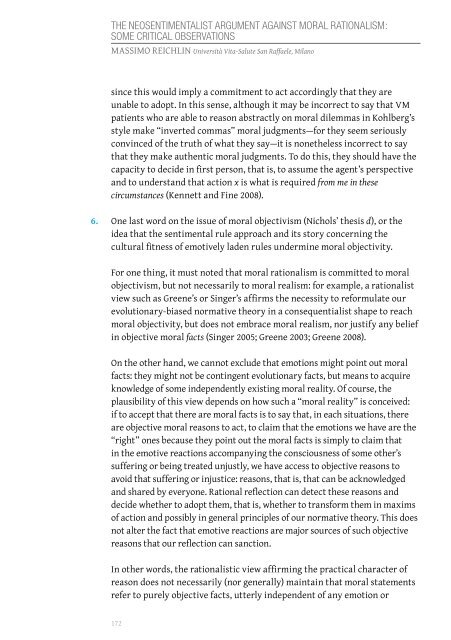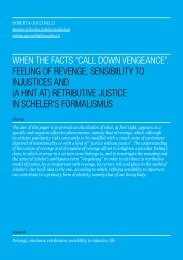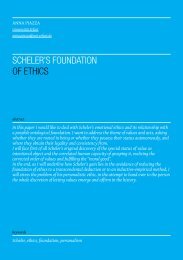the neosentimentalist argument against moral rationalism
the neosentimentalist argument against moral rationalism
the neosentimentalist argument against moral rationalism
Create successful ePaper yourself
Turn your PDF publications into a flip-book with our unique Google optimized e-Paper software.
6.<br />
<strong>the</strong> neosentiMentalist aRGuMent aGainst MoRal RationalisM:<br />
soMe CRitiCal oBseRVations<br />
massimo reichlin università Vita-Salute San raffaele, milano<br />
since this would imply a commitment to act accordingly that <strong>the</strong>y are<br />
unable to adopt. in this sense, although it may be incorrect to say that Vm<br />
patients who are able to reason abstractly on <strong>moral</strong> dilemmas in Kohlberg’s<br />
style make “inverted commas” <strong>moral</strong> judgments—for <strong>the</strong>y seem seriously<br />
convinced of <strong>the</strong> truth of what <strong>the</strong>y say—it is none<strong>the</strong>less incorrect to say<br />
that <strong>the</strong>y make au<strong>the</strong>ntic <strong>moral</strong> judgments. to do this, <strong>the</strong>y should have <strong>the</strong><br />
capacity to decide in first person, that is, to assume <strong>the</strong> agent’s perspective<br />
and to understand that action x is what is required from me in <strong>the</strong>se<br />
circumstances (Kennett and Fine 2008).<br />
one last word on <strong>the</strong> issue of <strong>moral</strong> objectivism (nichols’ <strong>the</strong>sis d), or <strong>the</strong><br />
idea that <strong>the</strong> sentimental rule approach and its story concerning <strong>the</strong><br />
cultural fitness of emotively laden rules undermine <strong>moral</strong> objectivity.<br />
For one thing, it must noted that <strong>moral</strong> <strong>rationalism</strong> is committed to <strong>moral</strong><br />
objectivism, but not necessarily to <strong>moral</strong> realism: for example, a rationalist<br />
view such as Greene’s or Singer’s affirms <strong>the</strong> necessity to reformulate our<br />
evolutionary-biased normative <strong>the</strong>ory in a consequentialist shape to reach<br />
<strong>moral</strong> objectivity, but does not embrace <strong>moral</strong> realism, nor justify any belief<br />
in objective <strong>moral</strong> facts (singer 2005; greene 2003; greene 2008).<br />
on <strong>the</strong> o<strong>the</strong>r hand, we cannot exclude that emotions might point out <strong>moral</strong><br />
facts: <strong>the</strong>y might not be contingent evolutionary facts, but means to acquire<br />
knowledge of some independently existing <strong>moral</strong> reality. of course, <strong>the</strong><br />
plausibility of this view depends on how such a “<strong>moral</strong> reality” is conceived:<br />
if to accept that <strong>the</strong>re are <strong>moral</strong> facts is to say that, in each situations, <strong>the</strong>re<br />
are objective <strong>moral</strong> reasons to act, to claim that <strong>the</strong> emotions we have are <strong>the</strong><br />
“right” ones because <strong>the</strong>y point out <strong>the</strong> <strong>moral</strong> facts is simply to claim that<br />
in <strong>the</strong> emotive reactions accompanying <strong>the</strong> consciousness of some o<strong>the</strong>r’s<br />
suffering or being treated unjustly, we have access to objective reasons to<br />
avoid that suffering or injustice: reasons, that is, that can be acknowledged<br />
and shared by everyone. Rational reflection can detect <strong>the</strong>se reasons and<br />
decide whe<strong>the</strong>r to adopt <strong>the</strong>m, that is, whe<strong>the</strong>r to transform <strong>the</strong>m in maxims<br />
of action and possibly in general principles of our normative <strong>the</strong>ory. this does<br />
not alter <strong>the</strong> fact that emotive reactions are major sources of such objective<br />
reasons that our reflection can sanction.<br />
In o<strong>the</strong>r words, <strong>the</strong> rationalistic view affirming <strong>the</strong> practical character of<br />
reason does not necessarily (nor generally) maintain that <strong>moral</strong> statements<br />
refer to purely objective facts, utterly independent of any emotion or<br />
172




